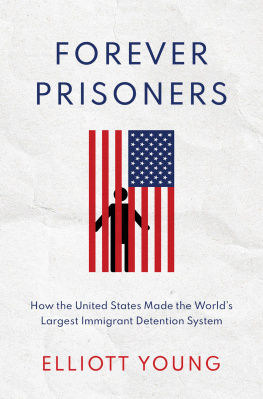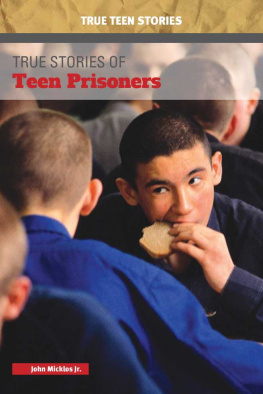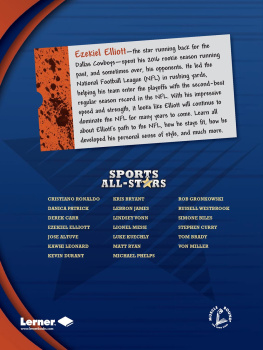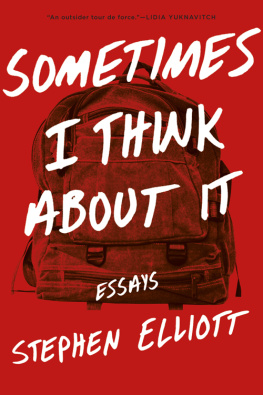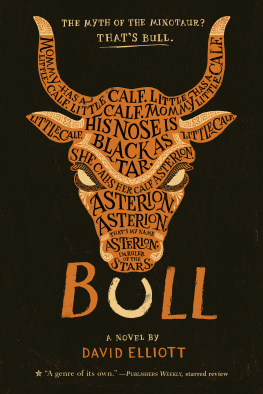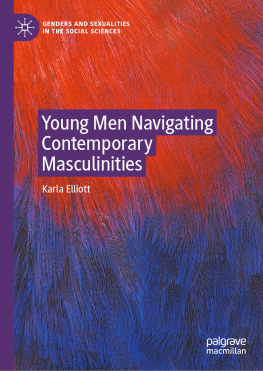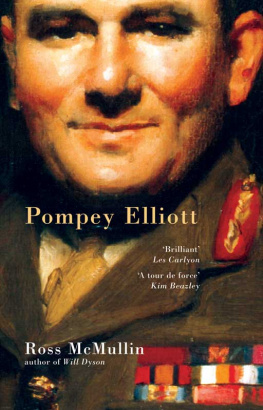Elliott Young - Forever Prisoners
Here you can read online Elliott Young - Forever Prisoners full text of the book (entire story) in english for free. Download pdf and epub, get meaning, cover and reviews about this ebook. year: 2020, publisher: Oxford University Press, genre: Politics. Description of the work, (preface) as well as reviews are available. Best literature library LitArk.com created for fans of good reading and offers a wide selection of genres:
Romance novel
Science fiction
Adventure
Detective
Science
History
Home and family
Prose
Art
Politics
Computer
Non-fiction
Religion
Business
Children
Humor
Choose a favorite category and find really read worthwhile books. Enjoy immersion in the world of imagination, feel the emotions of the characters or learn something new for yourself, make an fascinating discovery.
- Book:Forever Prisoners
- Author:
- Publisher:Oxford University Press
- Genre:
- Year:2020
- Rating:5 / 5
- Favourites:Add to favourites
- Your mark:
- 100
- 1
- 2
- 3
- 4
- 5
Forever Prisoners: summary, description and annotation
We offer to read an annotation, description, summary or preface (depends on what the author of the book "Forever Prisoners" wrote himself). If you haven't found the necessary information about the book — write in the comments, we will try to find it.
Forever Prisoners — read online for free the complete book (whole text) full work
Below is the text of the book, divided by pages. System saving the place of the last page read, allows you to conveniently read the book "Forever Prisoners" online for free, without having to search again every time where you left off. Put a bookmark, and you can go to the page where you finished reading at any time.
Font size:
Interval:
Bookmark:


Oxford University Press is a department of the University of Oxford. It furthers the Universitys objective of excellence in research, scholarship, and education by publishing worldwide. Oxford is a registered trade mark of Oxford University Press in the UK and certain other countries.
Published in the United States of America by Oxford University Press
198 Madison Avenue, New York, NY 10016, United States of America.
Oxford University Press 2021
All rights reserved. No part of this publication may be reproduced, stored in a retrieval system, or transmitted, in any form or by any means, without the prior permission in writing of Oxford University Press, or as expressly permitted by law, by license, or under terms agreed with the appropriate reproduction rights organization. Inquiries concerning reproduction outside the scope of the above should be sent to the Rights Department, Oxford University Press, at the address above.
You must not circulate this work in any other form and you must impose this same condition on any acquirer.
Library of Congress Cataloging-in-Publication Data
Names: Young, Elliott, 1967 author.
Title: Forever prisoners : how the United States made the worlds
largest immigrant detention system / Elliott Young.
Description: New York : Oxford University Press, 2021. |
Includes bibliographical references and index
Identifiers: LCCN 2020018277 (print) | LCCN 2020018278 (ebook) |
ISBN 9780190085957 (hardback) | ISBN 9780190085971 (epub) | ISBN 9780190085988
Subjects: LCSH: United StatesEmigration and immigrationGovernment policy. |
ImmigrantsGovernemnt policyUnited States. |
Alien detention centersUnited StatesHistory. | Detention of personsUnited States. |
Human rightsUnited States.
Classification: LCC JV6483 .Y68 2021 (print) |
LCC JV6483 (ebook) | DDC 365/.4dc23
LC record available at https://lccn.loc.gov/2020018277
LC ebook record available at https://lccn.loc.gov/2020018278
For
Reiko, Zulema, and Ryo
And all the migrants who strive to be free
This book emerged in a moment of political crisis when detention and deportations have reached unprecedented levels in the United States. I had been studying transnational migration for years, but I became more aware of the problem of mass incarceration and policing through conversations with my partner, Reiko Hillyer, and a friend, David Menschel. I began to see how policing and immigrant detention were inextricably linked. What began as a book about immigrant detention became a project about mass incarceration.
Following the election of President Trump, a group of immigration historians consulted with each other over email about how to confront what was likely to be an all-out assault on immigrants. Sanctuary campuses was one idea that we advocated given our location in universities. In the coming months, US Immigration and Customs Enforcement (ICE) began an intense effort to round up undocumented immigrants inside courthouses, and outside of hospitals and schools. Immigrant advocates responded by passing ordinances to disentangle local law enforcement with immigration enforcement in what became a widespread sanctuary movement across cities and universities. We knew what was happening around us, but the genealogy of the immigrant detention system remained shrouded in mystery. Furthermore, the activist calls to abolish ICE ignored this much longer history of detention and deportation. Hopefully, this book can serve advocates as a reminder of the many ways immigrant incarceration has happened in the past so we do not simply replace one form of prison for another.
Since 2014 when I began researching and writing this book, I have written more than 250 expert witness declarations for asylum cases in Mexico, Honduras, Guatemala, El Salvador, and Venezuela. It is that work that put me in touch with Mayra Machado. My testimony has also helped many of these families to gain asylum and reminded me that my academic knowledge can be useful in the real world. I thank Stephen Manning of the Innovation Law Lab for getting me involved in such work. My hat goes off to the many immigration attorneys across the country and in the United Kingdom with whom I have collaborated on asylum cases. They are doing amazing work under the most difficult conditions.
Intellectually, I have been sustained by the Tepoztln Institute for Transnational History of the Americas, an institute I co-founded with Pamela Voekel in 2004, which brings together scholars from across the Americas in a small town outside of Mexico City each summer. I have learned and drawn inspiration from the amazing array of scholars, artists, and activists who have participated. The collective that runs the institute has become my alt-family. I want to particularly thank collectivistas Josie Saldaa, David Kazanjian, Alejandra Puerto, Marisa Belausteguigoitia, Micol Seigel, David Sartorius, Jorge Giovannetti, Anna Moore, and Shane Dillingham for their comradeship and ideas. I want to also thank my colleagues in the History department at Lewis & Clark College who have read various chapters of this book in our colloquium, and especially Mo Healy and Andy Bernstein for their comments in an intensive summer workshop. Law scholars and professors Stephen Manning, Juliet Stumpf, and Aliza Kaplan were my legal dream team who helped me get the legal details right for the final chapter. Over the years I have also been lucky to have amazing Lewis & Clark College student research assistants who helped me do archival research in Washington, DC; Mexico City; Seattle; San Francisco; and New York City: Kate Wackett, Megan Scott-Busenbark, Alexander Castanes, Lauren Krumholz, Maya Litauer Chan, Will Sarvis, Maggie Costello, and Sofia Knutson.
This kind of project could not have happened without the scholarship and mentorship from many scholars of migration (too many to name), including the following: Ana Raquel Minian, Madeline Hsu, Mae Ngai, Erika Lee, Maria Cristina Garcia, Maddalena Marrinari, Hidetaka Hirota, Torrie Hester, Naomi Paik, Adam Goodman, and Alexander Stephens. Mad props to Kelly Lytle-Hernndez who invited me to participate in a special issue on the Carceral West, resulting in the article, Caging Immigrants at McNeil Island Federal Prison, 18801940, Pacific Historical Review (2019) 88 (1): 4885, which eventually formed the basis for the first chapter in the book. Through her activism in Los Angeles, her rigorous scholarship, and her keen editorial eye, Kelly is a model for scholar-activists.
History does not get written without the archivists, so thank you to those at the National Archives in Washington, DC, and Seattle, the Washington State archives, the Atlanta History Center, and the Canadian Archives who made this book possible. Thanks to the two anonymous reviewers who gave me detailed and intense feedback that pushed me to hone my argument. And to Susan Ferber at Oxford University Press, who understood what I was trying to do with this book and helped me to make it the best version that it could be.
I especially want to recognize the people shared their personal and traumatic stories with me. Elsa Kudo, Seeichi and Angelica Higashides daughter, who was herself locked up in a detention camp in Texas as a child, told me about her and her familys experiences. Tami Kudo Harnish, Elsas daughter, also generously commented on the chapter about her family. Gary Leshaw, who provided legal defense for Mariel Cubans at Atlanta Penitentiary, and Sally Sandige, who coordinated the Coalition to Support Cuban Detainees, both granted me interviews and allowed me access to dozens of boxes of documents that provided me with a unique understanding of the detainees own views on their incarceration. Finally, Mayra Machado has been a constant source of inspiration for me. Seeing how she organized her own legal defense, coordinated solidarity from around the country, and supported her children, all from inside an ICE detention center in rural Louisiana, was a lesson in persistence. She has lost all of her legal battles thus far, but she refuses to give up. Big shout out to Isabel Medina and Benjamin Osorio, attorneys, who both took on Mayras case pro bono and who continue to pursue justice for her.
Font size:
Interval:
Bookmark:
Similar books «Forever Prisoners»
Look at similar books to Forever Prisoners. We have selected literature similar in name and meaning in the hope of providing readers with more options to find new, interesting, not yet read works.
Discussion, reviews of the book Forever Prisoners and just readers' own opinions. Leave your comments, write what you think about the work, its meaning or the main characters. Specify what exactly you liked and what you didn't like, and why you think so.

